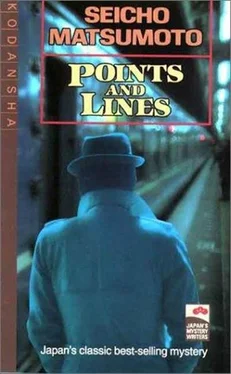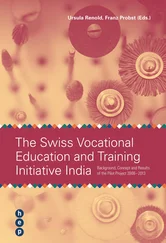Seichō Matsumoto - Points And Lines
Здесь есть возможность читать онлайн «Seichō Matsumoto - Points And Lines» весь текст электронной книги совершенно бесплатно (целиком полную версию без сокращений). В некоторых случаях можно слушать аудио, скачать через торрент в формате fb2 и присутствует краткое содержание. Жанр: Детектив, на английском языке. Описание произведения, (предисловие) а так же отзывы посетителей доступны на портале библиотеки ЛибКат.
- Название:Points And Lines
- Автор:
- Жанр:
- Год:неизвестен
- ISBN:нет данных
- Рейтинг книги:5 / 5. Голосов: 1
-
Избранное:Добавить в избранное
- Отзывы:
-
Ваша оценка:
- 100
- 1
- 2
- 3
- 4
- 5
Points And Lines: краткое содержание, описание и аннотация
Предлагаем к чтению аннотацию, описание, краткое содержание или предисловие (зависит от того, что написал сам автор книги «Points And Lines»). Если вы не нашли необходимую информацию о книге — напишите в комментариях, мы постараемся отыскать её.
Points And Lines — читать онлайн бесплатно полную книгу (весь текст) целиком
Ниже представлен текст книги, разбитый по страницам. Система сохранения места последней прочитанной страницы, позволяет с удобством читать онлайн бесплатно книгу «Points And Lines», без необходимости каждый раз заново искать на чём Вы остановились. Поставьте закладку, и сможете в любой момент перейти на страницу, на которой закончили чтение.
Интервал:
Закладка:
"Kawanishi of Futaba Company says he met Yasuda at Sapporo Station on Jan. 21 stop Yasuda stayed at Marusō Inn Jan. 22 and 23."
He had half expected the confirmation; nevertheless he was disappointed. Kawanishi did meet Yasuda at Sapporo Station on January 21; Yasuda did stay at the Marusō Inn on Jan. 22 and 23. It was exactly as the man had claimed.
Mihara sat down at his desk and lit a cigarette. He was alone in the room. He could think quietly.
Yes, it was the answer he had expected. Yasuda would not tell a lie that could be easily detected. This meant that Yasuda had actually arrived in Hokkaido on the twenty-first. Sayama and Otoki committed suicide in Kyushu, at the other end of Japan, on the night of the twentieth; their bodies were discovered the following morning. During this time, Yasuda was aboard the express Towada on his way to Hokkaido. He had to be; he could not have met Kawanishi at Sapporo Station otherwise.
But Mihara was troubled by the fact that Yasuda had used the four minutes at Tokyo Station to make a third party witness Sayama and Otoki's departure. Why he had done this was still not clear. And since it was not clear, he could not help connecting Yasuda's movements on the twentieth and the twenty-first with the tragedy in Kyushu. Mihara was honest enough to admit to himself that he wanted to make the connection. He suspected Yasuda. Of what, he was still unable to say. Yet the man was actually traveling away from Kyushu at the time. Instead of going west he was going north!
He lit a second cigarette. Was there something suspicious, he wondered, in the mere fact that Yasuda was traveling in the opposite direction? Wasn't there something unusual, almost forced, in this trip of Yasuda's? Could it have been as deliberate, as carefully planned, as his use of the four-minute interval?
Mihara took from his desk drawer the file which contained the reports on the suicides. These were the materials that Tori-gai had collected for him. It was a long time since he had given a thought to that kindly little man with the thin face and the tired eyes.
He looked through the documents. Sayama and Otoki… they had swallowed potassium cyanide… the night of January 20, between the hours of 10 and 11. Double suicide, the police had concluded. There was the autopsy report.
He turned to the railway timetable on his desk. At that particular hour, he noted, the express Towada was passing through Hisa-no-hama or Hirono. He looked again at the schedule. At 6:30 on the morning of the twenty-first, the hour the bodies were discovered, the train had just left Ichinohe station in Iwate Prefecture. If Yasuda was a passenger it would be impossible to connect him with the events on Kashii Beach in Kyushu, either as to time or to place.
He had reached this conclusion when he realized suddenly that his manner of checking the trains was exactly as Mrs. Yasuda had described in the little magazine. The thought made him smile. In her essay she had written that her husband was always studying the timetable. Could that mean that he knew it thoroughly, perhaps by heart? Mihara had heard of people who were amused by such things. There was certainly something strange about this interest of his. Could a train schedule be the basis of an alibi?
No, it was incorrect to call it an alibi. Yasuda's absence from Tokyo during the three eventful days had been confirmed. Now what was needed was evidence that he had not been in Kyushu, that he was not on his way to Kyushu during this period.
Mihara picked up the telegram and reread it. He was not questioning the reply. The statements must be correct. But the important facts were missing. It was as if he were seeing a building from the outside only. There was something more, some addition, perhaps, to the structure that could not be seen from where he stood.
I've got to go to Hokkaido, he said to himself. In order to find out what was wrong with a thing, one had to see it, touch it, feel it. This was equally true of an investigation.
The next morning, as soon as Inspector Kasai arrived Mihara went up to his desk.
"We have the reply from Sapporo," he said, showing Kasai the telegram.
"Just as Yasuda reported," the inspector commented. "Sit down." He knew Mihara wanted to talk to him.
"I went to Kamakura yesterday," Mihara began.
"I know, I read the memo you left on my desk."
"I called on Yasuda's wife. I wanted to check his statements. She's in bed with tuberculosis, just as he said."
"Which means that everything he's told us so far has been true."
"I suppose so. But I came upon an interesting piece of information." Mihara then told him about the magazine article by Ryko Yasuda which the doctor had given him to read, and how it had mentioned Yasuda's interest in the railway timetable.
"That is interesting, to be sure." The chief folded his hands on the desk. "It could have some bearing on the four-minute train interval at Tokyo Station."
"I believe so too." Mihara was encouraged. "The fact that Yasuda deliberately had witnesses present during those four minutes makes me believe that he had something to do with the double suicide. This is just a hunch. I have nothing to support it. But I feel almost certain that he had something to do with it." Mihara was finally admitting that he believed a crime had been committed in connection with the suicides.
"Exactly!"
His boss, he discovered, was of the same opinion.
"I would like your permission to go to Hokkaido. I cannot accept the story that Yasuda was on his way to Hokkaido the day of the suicides. Even though we have the report from the Sapporo police, I can't help feeling that there are hidden facts in the case. When we find out what they are, we'll know why Yasuda needed to have a third party witness Sayama's departure from Tokyo Station."
Kasai did not answer at once. His sat thinking, his eyes averted. Suddenly he said, "Good! We've come this far. Go and investigate and clear away the suspicions. I'll talk to the section chief."
Mihara looked up at him, a question in his glance. "Is the section chief opposed to further investigation?"
"Not exactly opposed," Kasai answered vaguely. "There's no point in pursuing an investigation when the case is clearly one of suicide, he once said to me. For that reason he doesn't want to waste time on it. But don't you worry, I'll talk to him."
Inspector Kasai smiled at Mihara as if to encourage him.
10 An Eyewitness in Hokkaido
Mihara took the express Towada from Ueno Station the following evening. This was the train Yasuda claimed he had taken to Hokkaido. Mihara wanted to follow in his footsteps as closely as possible.
Only after passing Taira was Mihara able to fall asleep. The two passengers across the aisle never stopped talking and their loud voices and broad local dialect both amused and disturbed him. He was unable to relax. But by eleven o'clock the day's exertions took their toll; he dozed off. He was awakened at Sendai by the noise and bustle around him, but dropped off again and slept until the train arrived at Asamushi.
The sea looked fresh and inviting in the early dawn. As Mihara was starting to get ready to leave, the conductor appeared at the entrance to the car. He greeted the passengers with a cheerful "Good morning!" then announced, "the train is about to arrive at the terminal, Aomori Station. All of you must be very tired from the long journey. Will those who wish to board the Sei-kan ferry to Hakodate please sign the passenger register. I will now pass out the forms."
He passed through the car and handed the blank forms to those passengers who requested them. Since this was Mihara's first trip to Hokkaido the procedure was unfamiliar to him. He held out his hand for one. It was a single sheet with two identical columns marked A and B, the same information to be entered in each. The completed form had to be surrendered at the gate, upon leaving the station.
Читать дальшеИнтервал:
Закладка:
Похожие книги на «Points And Lines»
Представляем Вашему вниманию похожие книги на «Points And Lines» списком для выбора. Мы отобрали схожую по названию и смыслу литературу в надежде предоставить читателям больше вариантов отыскать новые, интересные, ещё непрочитанные произведения.
Обсуждение, отзывы о книге «Points And Lines» и просто собственные мнения читателей. Оставьте ваши комментарии, напишите, что Вы думаете о произведении, его смысле или главных героях. Укажите что конкретно понравилось, а что нет, и почему Вы так считаете.












